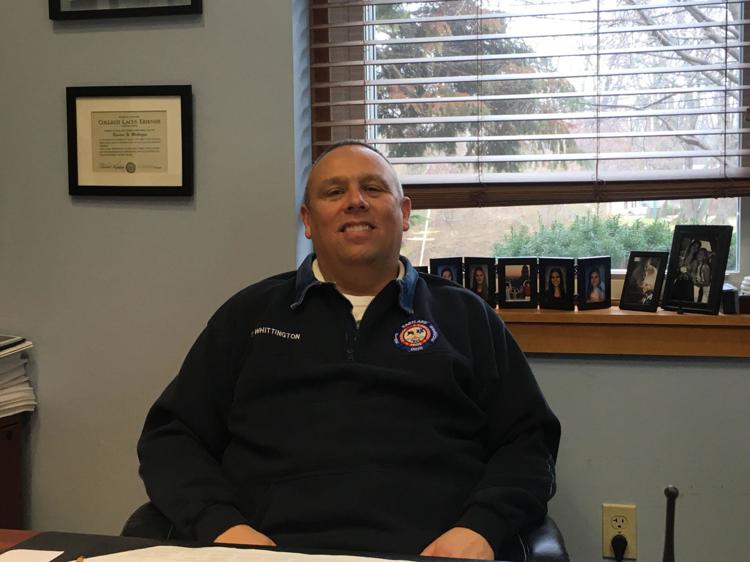Eastlake Fire Chief reflects on how firefighters’ jobs have changed

Ted Whittington has been a firefighter for just shy of a quarter century, but the Eastlake fire chief is hard pressed to remember how much of his profession has remained the same over that time.
“Our world continues to change and we need to adapt to those things,” said Whittington, who’s been the Eastlake chief for the past decade and has been with the department for 20 years.
When Whittington was a young boy, it was the police departments that would transport sick people. It’s evolved a lot since then, he said.
Fire Departments “got into the EMS business,” as Whittington put it, in the 1970s. In Eastlake today, and almost every community, there’s a specialized part of the department.
Eastlake is home to a Great Lake and a river. It’s specialization is diving, so a contingent of the force is trained in that field.
“I’ve heard this said before: all of us have mission statements to guide our people and to show our community, but really the mission of any department is dictated when 911 rings,” Whittington said. “Because people are having a bad day and when they call 911 they’re looking to make that better.
“So in all of the departments across the world there are certain inherent issues they have in their communities, but when someone calls and says ‘hey my hot water tank is leaking everywhere,’ I need to send someone over there to turn that off for them. Now, that’s not a specialized thing, but that’s the kind of adaptability we need to have.”
One aspect of the job that has remained fairly consistent is that many of the department’s calls involve a medical emergency.
“Some of these medical emergencies are the same thing,” he said. “We still see heart attacks, we still see strokes.”
There’s an important change with how departments address these calls, however: ambulances and paramedics are now like “roving emergency rooms.”
“Traditionally, when somebody had a stroke there was probably some kind of acceptability that because they had a stroke they would have deficits,” he said. “Our goal now is to not let that happen. Our goal is to go in there and get you definitive care so they can prevent any long-term illnesses.”
Whittington said the frequency of fires is likely less than it was in the 1960s and 1970s.
“There’s a lot of contributing factors,” he said. “One of the biggest things is education. We’re going into the schools talking to children all the time about the things to watch for in their home to make them safety marshals for their home.”
Smoke detectors have had an impact too, allowing for earlier detection. Homes are built better now too. The electrical systems we put in our homes are more efficient, he added.
Firefighter safety is also improving.
“There was a time you could see guys who had the dirtiest gear were the most accomplished guys in the department, the guys who had seen the most action, not realizing those were all carcinogens,” Whittington said.
“We’ve actually experienced deaths, we’ve had some real close colleagues who ended up getting some bad cancers and pass away,” he said.
Notably, Michael Louis Palumbo Jr., who worked as a firefighter in neighboring Willowick among other communities is one of those. Palumbo died in May 2017 after battling glioblastoma multiforme, a very aggressive form of brain cancer, presumably a result of his 25 years as firefighter.
Earlier that year Gov. John Kasich signed a bill known as the “Michael Louis Palumbo Jr. Act.” The bill allows firefighters who are diagnosed with cancer and who meet the set qualifications to now file a claim with the Ohio Bureau of Workers’ Compensation.
“It’s not acceptable, just because the job is dangerous, to have people get hurt,” Whittington said. “That’s not an acceptable part of any firefighting program. The job can be inherently dangerous in some of these aspects, but we need to manage it in a way — through training and through the equipment — we need to manage it in a way where we limit them getting injured.”
Every day on the job is a different one and the job is often a rewarding one.
“Every day across this county, every police and fire department is influencing somebody’s life,” he said. “You hope the influence is positive. But even if it’s not saving somebody, we go to somebody’s house and change their smoke detector battery. That’s an influence in my mind because now if something would happen in their home I know they got a fresh battery.”
He said everyone’s bad day can be titled differently.
“What’s a bad day to you might not be a bad day to me, but at the end of the day it’s a bad day,” Whittington said. “Whatever your perspective on it is, I need to go in and take the bad day your having — and hopefully it’s not a life-threatening bad day — and just make it better for you.”
